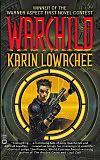In the dream you were home.
Title: Warchild
Author: Karin Lowachee
Type: Sci-fi
Slash: Male Subtext & Situational Asexuality
Length: 464 pages
Rating: 5/5
Back of the Book:
The merchant ship Mukudori encompasses the whole of eight-year-old Jos's world, until a notorious pirate destroys the ship, slaughters the adults, and enslaves the children. Thus begins a desperate odyssey of terror and escape that takes Jos beyond known space to the homeworld of the strits, Earth's alien enemies. To survive, the boy must become a living weapon and a master spy. But no training will protect Jos in a war where every hope might be a deadly lie, and every friendship might hide a lethal betrayal. And all the while he will face the most grueling trial.
My thoughts let me show you them:

I started the book with some trepidation. Wait, I'm lying. I started the book with loads of trepidation. For one, the book begins in second person. Yep, your eyes are not deceiving you, they are telling you the truth. I REPEAT, second person past tense, for a whole chapter. I'm more used to that than most, I think, being a fan of Easton Ellis, but still it's something that can put off a lot of readers. Another thing that made me skip back a bit was that I was told the book started when the main character (Jos) is a child. I read plenty of children's books, but I don't like to read "Adult" books with child protagonists. What I mean is, with a lot of children's books the context is set in childhood (duh) and the setting, theme, etc. aids the author in remembering, "My protagonist is a kid." In Adult books with children what happens a lot of the time is that the child sounds way, way to mature to make a credible child. It's almost as if you're reading poetry and the child is a metaphor for something other thing not really having to do with actual kids. I don't like it. Another (another) thing was that I feared that the technical aspects of the space ships and the weapons and the martial arts would overwhelm everything else. To top it all off, is the quite understandable Brian Kinney-like skepticism one should always employ while venturing into sci-fi, specially if you're a ho for characters and characterization.
ETA: I didn't even mention the sexual abuse theme, which could have been (ironically) abused, but wasn't. And the war theme, which could have been glorified but really, really wasn't.
How many times does the plot overwhelm the characters in sci-fi to the point that the characters seem like sockpuppets and the relationships seem made out of paper mache? Too many to count, right? Despite all my tippy-toeing, finding the water too hot, too cold, too lukewarm, I've to tell you that after the first page I was hooked. HOOKED. Jos is the type of character where if you're not inside his head you're not anywhere near him. In fact, he hides stuff even from himself, to such an extent that you end up inferring more than you know, despite the radically intimate POV. This kind of character makes me besotted beyond belief, because it's hard to find an author that understand her characters so well she can make them mysterious without creating a vacuum. Jos is not an empty metaphor, he's just someone that will take you more than one brilliant book to completely "get."
I understand this book will not be for everyone. If you want anybody in the book to ever say things about their feelings (cue Love Story soundtrack here) then you're in for a rough ride, because there's none of that. You'll know what the characters feel (or think you do) but you'll never be told. Like in life, there's no certainty of anyone's real thoughts and real feelings. What there is in abundance is pitch-perfect characterization, atypical second players and wonderful writing.
(I hope one of you will read it and tell me what you think about Niko, because some days I am pissed at him to no end and other days I feel extremely understanding. It varies.)
INSERT VILLAIN HERE: There is the most bastardly bastard in this book that you'll ever manage to fictionally meet. His name is Falcone and he is a *badwordhavingtodowithOedipus* of the highest --lowest?-- order. I haven't read such a purely evil man since they wussified Lecter. This man is just bad news, but he isn't two-dimensional. How did Lowachee manage that? To make him irredeemable and yet make him interesting and not 2-D? Don't ask me. I'm not a writer.
I don't want to say anymore, because I want all of you experience book for yourselves. Tell if you like it, or hate it, or hate me because I pushed it on to you. Inquiring minds want to know.